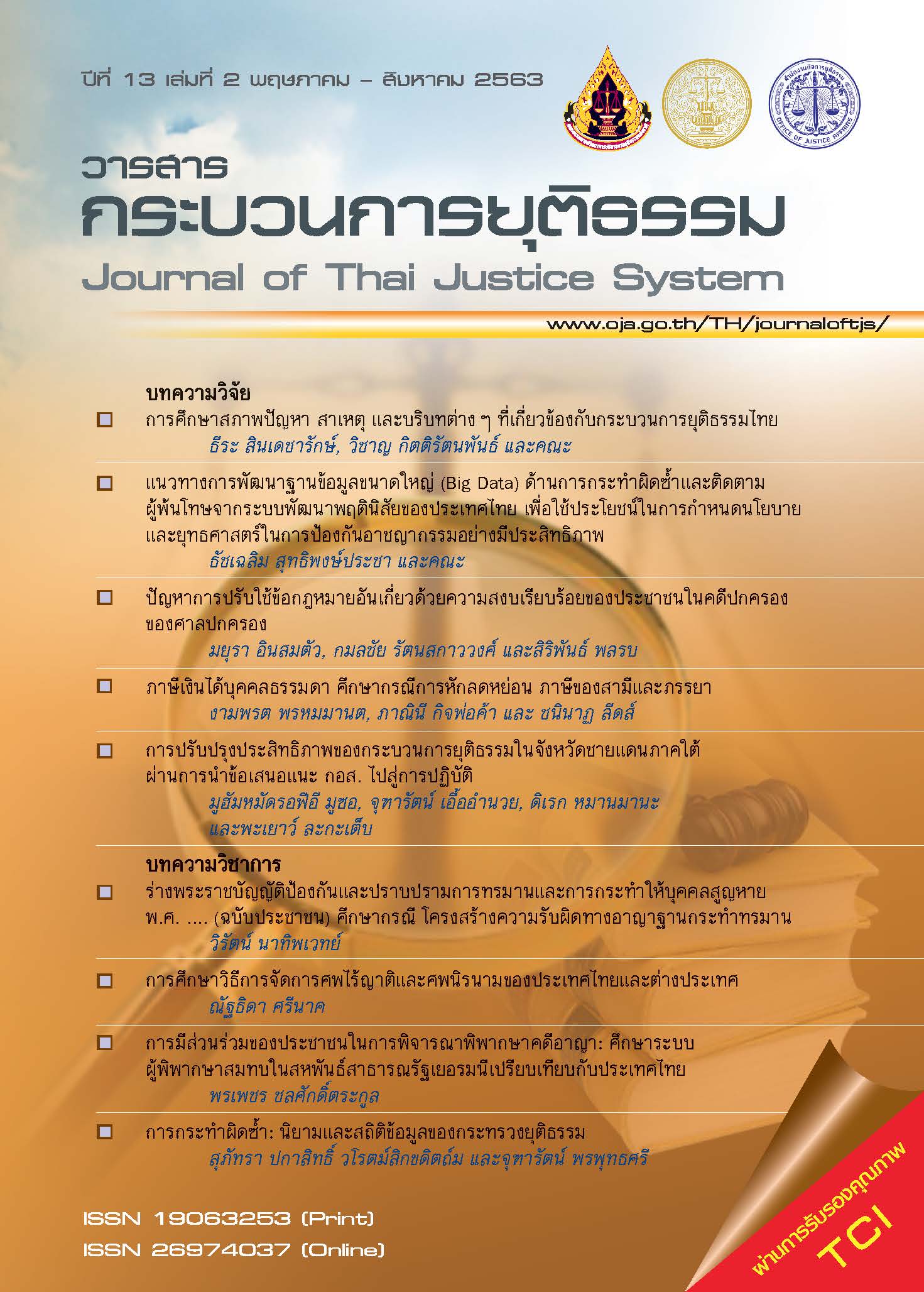การปรับปรุงประสิทธิภาพของกระบวนการยุติธรรมในจังหวัดชายแดนภาคใต้ผ่านการนำข้อเสนอแนะ กอส.ไปสู่การปฏิบัติ
Main Article Content
บทคัดย่อ
บทความนี้มีวัตถุประสงค์เพื่อแสดงให้เห็นถึงรูปแบบของการนำข้อเสนอแนะของคณะกรรมการอิสระเพื่อความสมานฉันท์แห่งชาติในประเด็นที่เกี่ยวข้องกับกระบวนการยุติธรรมไปสู่การปฏิบัติ พร้อมข้อเสนอแนะแนวทางในการพัฒนาประสิทธิภาพของการอำนวยความยุติธรรมในพื้นที่จังหวัดชายแดนภาคใต้ ซึ่งเก็บรวบรวมข้อมูลด้วยการสนทนากลุ่มกับเจ้าหน้าที่ในหน่วยงานที่เกี่ยวข้องกับการอำนวย ความยุติธรรมในจังหวัดชายแดนภาคใต้ และกลุ่มผู้ได้รับผลกระทบจากการปฏิบัติงานของเจ้าหน้าที่ นอกจากนี้มีการสัมภาษณ์เจาะลึกประชาชนผู้ได้รับผลกระทบจากการดำเนินกระบวนการยุติธรรมในพื้นที่จังหวัดชายแดนภาคใต้ จำนวน 20 คน และสัมภาษณ์เจาะลึกเจ้าหน้าที่ในหน่วยงานที่เกี่ยวข้องกับการอำนวยความยุติธรรมในจังหวัดชายแดนภาคใต้ จำนวน 15 คน ผลการศึกษาพบว่า การอำนวยความยุติธรรมของหน่วยงานในกระบวนการยุติธรรมได้มีการนำข้อเสนอแนะของ กอส. บางส่วนไปใช้เพื่อพัฒนาประสิทธิภาพของกระบวนการยุติธรรม ได้แก่ การประสานงานของหน่วยงานในกระบวนการยุติธรรมมี การเปลี่ยนแปลงไปในทิศทางที่ดีขึ้น มีการนำหน่วยงานด้านความมั่นคงและหน่วยงานด้านปกครอง
พร้อมกฎหมายพิเศษเข้ามามีบทบาทเสริมการทำงานของกระบวนการยุติธรรมหลัก การเยียวยาให้กับ
ผู้ได้รับผลกระทบ การปรับรูปแบบการทำงานโดยอาศัยการขับเคลื่อนผ่านคณะกรรมการพัฒนาการบริหารงานยุติธรรมระดับจังหวัด (กพยจ.) การนำเทคโนโลยีเข้ามาใช้ในการดำเนินการเพื่อให้ประชาชนสามารถเข้าถึงบริการด้านงานยุติธรรม และภาคประชาสังคมได้เข้ามามีบทบาทสำคัญในการปกป้องสิทธิและหาแนวทางในการแก้ปัญหาให้กับประชาชน ตลอดจนมีการปรับปรุงระบบกฎหมายอิสลามในจังหวัดชายแดนภาคใต้ โดยมีการจัดทำคู่มือหลักกฎหมายอิสลามว่าด้วยครอบครัวและมรดกเพื่อใช้เป็นหลักเกณฑ์ในการอ้างอิงเมื่อเกิดข้อพิพาท สำหรับข้อเสนอแนะเร่งด่วนเพื่อการพัฒนากระบวนการยุติธรรมในจังหวัดชายแดนภาคใต้จากการศึกษาครั้งนี้ เห็นว่าควรแก้ไขปัญหาการขาดความเชื่อมั่นในกระบวนการยุติธรรมและลดเงื่อนไขที่นำไปสู่การขยายผลความคิดต่างในพื้นที่ นอกจากนี้ควรจัดตั้งคณะกรรมการอิสระตรวจสอบและค้นหาความจริงเพื่อการปรองดองในพื้นที่จังหวัดชายแดนภาคใต้โดยนำหลักความยุติธรรมในระยะเปลี่ยนผ่านมาใช้เพื่อช่วยให้สังคมสามารถก้าวข้ามสถานการณ์ความขัดแย้งที่นำไปสู่การแก้ไขปัญหาอย่างยั่งยืนต่อไป
Article Details
ต้นฉบับที่ได้รับการตีพิมพ์ในวารสาร เป็นลิขสิทธิ์ของวารสารกระบวนการยุติธรรม แต่ความคิดเห็นที่ปรากฏในเนื้อหาของบทความในวารสารกระบวนการยุติธรรม ถือเป็นความรับผิดชอบของผู้เขียนแต่เพียงผู้เดียว
เอกสารอ้างอิง
คณะกรรมการอิสระเพื่อความสมานฉันท์แห่งชาติ. (2549). รายงานคณะกรรมการอิสระเพื่อความสมานฉันท์แห่งชาติ (กอส.): เอาชนะความรุนแรงด้วยพลังสมานฉันท์: บทสรุปสำหรับผู้บริหาร. กรุงเทพฯ: ผู้แต่ง.
จุฑารัตน์ เอื้ออำนวย, กมลทิพย์ คติการ, สุทธิ สุขยิ่ง, สหการณ์ เพ็ชรนรินทร์, จิรภา สินธุนาวา, ชัยทิศ พิเศษสกลกิจ และคนอื่น ๆ. (2548). การดำเนินกระบวนการยุติธรรมใน 3 จังหวัดชายแดนภาคใต้: ปัญหาและแนวทางการแก้ไข (กอส.) กรุงเทพมหานคร: สำนักงานเลขาธิการคณะรัฐมนตรี.
จุฑารัตน์ เอื้ออำนวย. (2551). สังคมวิทยาอาชญากรรม. กรุงเทพมหานคร: สำนักพิมพ์แห่งจุฬาลงกรณ์มหาวิทยาลัย.
มูฮัมหมัดรอฟีอี มูซอ และวรพจน์ ปานรอด. (2560). การพัฒนาระบบฐานข้อมูลเพื่อการบริหารงานยุติธรรม ในจังหวัดชายแดนภาคใต้ของไทย. กรุงเทพมหานคร: สำนักงานกิจการยุติธรรม.
ศารุต แขวงโสภา. (2542). ปัจจัยที่มีผลกระทบต่อการป้องกันปราบปรามการก่อการร้ายของเจ้าหน้าที่ตำรวจในพื้นที่จังหวัดยะลา ปัตตานี และนราธิวาส. วิทยานิพนธ์สังคมวิทยามหาบัณฑิต. จุฬาลงกรณ์มหาวิทยาลัย.
Gerstenfeld, B. (2018). Hate crime causes, control and controversies, forth edition. London: SAGE Publication.
Home Office, UK. (2016). Action against hate the UK government’s plan for tacking hate crime. London: HOM.
Hermann, M. (1965). Comparative criminology (Vol.1). London: Routledge and Kegan Paul.


